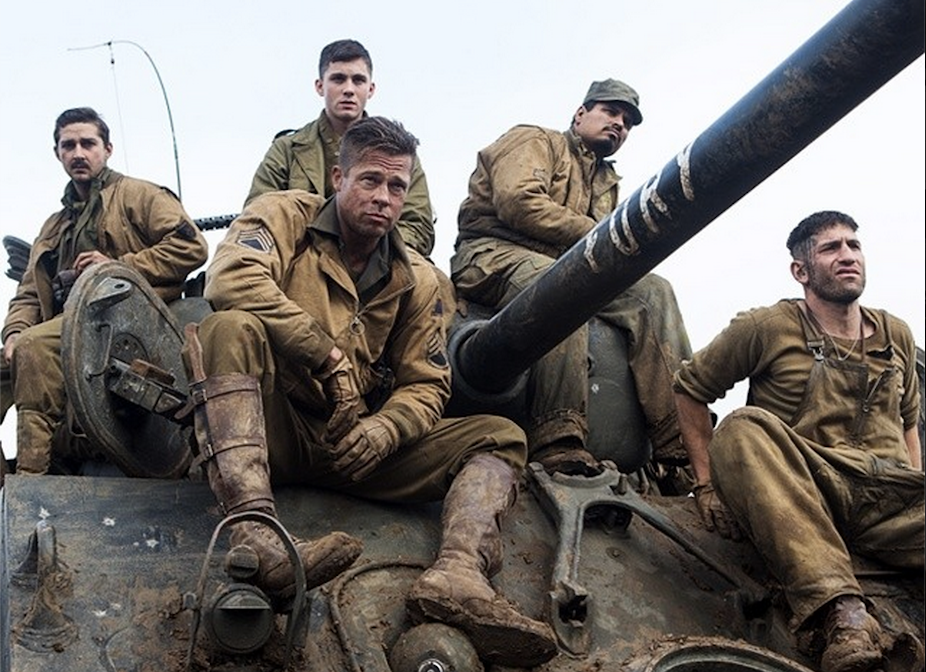Brad Pitt says his new Oscar-tipped film Fury is “a real study in leadership and learning to command respect and because of this, I am now a better father”.
But while many reviewers have commented on the “moral ambiguity” and “realism” of Fury, hardly any have commented on a key “sex scene” that made me wish I hadn’t gone to see it – and left me wondering what Pitt’s wife Angelina Jolie thinks too.
Fury doesn’t glorify war, which is shown as realistically brutal. But it does glorify the revered leader of a small tank crew, Collier (Pitt), despite the way his character commits and encourages others to commit war crimes: first with the execution of an unarmed prisoner of war, and later in claiming the sexual spoils of war.
The Americans have taken over a German town, where they are looting and “taking” women.
Pitt’s character Collier and “newbie” teenage soldier Norman (played by Logan Lerman) enter an apartment to find a woman and a teenage girl Emma – both utterly terrified.
Yet as Guardian critic Peter Bradshaw writes, it quickly turns from terror into a:
bizarrely naive ‘coming-of-age’ sex scene that director David Ayer seems to think is some kind of humanistically redemptive moment.
Collier tells Norman to take the teenage Emma into the bedroom:
She’s a good clean girl. If you don’t take her into that bedroom, I will.
Yet despite Norman taking a machine gun into the room with the girl, the sex scene between them is then shot as consensual: a wonderful loss-of-virginity moment. This is reinforced by the congratulations and snickering comments Norman gets from his fellow officers when they arrive in the apartment later on.
It’s surprising how few reviewers have written about the scene, although Fox5 San Diego’s Josh Board did:
Perhaps Pitt is trying to just light a fire under the new guy when he tells him to take a girl to bed (“She’s a good, clean girl. If you don’t take her into that bedroom, I will.”). But to me, that’s a threat of rape. Are we supposed to cheer the fact that this young soldier loses his virginity and not think about how these women were forced into this situation?
Of course, some people who watch Fury might see this scene and interpret it the way the director seems to want us to: as a moment where two people find comfort in each other in a tense situation. Some audiences have even laughed at it – including at the screening I went to.

But as Pitt’s wife Angelina Jolie knows better than most people, international law is clear about whether sexual consent is possible when civilians are faced with armed soldiers.
Rape has been a war crime since the 1800s, but the definition of what is considered rape has been clarified in the late 20th century, particularly by the Rwandan and Yugoslav International Tribunals.
The Akayesu case at the International Criminal Tribunal for Rwanda ruled that “coercion may be inherent in certain circumstances, such as armed conflict or … military presence”.
While it is not appropriate to always portray women as victims, or as incapable of sexual autonomy, the circumstances in Fury are certainly inherently coercive.
If the film starred a different A-list actor, all this wouldn’t be quite so surprising. But Pitt is clearly aware of the issue of wartime sexual violence.
Jolie is a Special Envoy for the United Nations High Commissioner for Human Rights. In June this year she co-chaired the Global Summit to End Sexual Violence in Conflict, and Pitt joined her.
She also works with the Preventing Sexual Violence Initiative, including with rape survivors, for which she was recently awarded an honorary damehood by Queen Elizabeth.
Jolie has stated that rape in war “has nothing to do with sex, everything to do with power”. It is exactly power that is the context of the rape in Fury.
Pitt could have chosen to highlight this in media interviews about the film. But as far as I have seen, he hasn’t, instead largely focusing on the film’s realism and the “real leadership” his character showed“.
The 50-year-old father of six was also happy for his 13-year-old son Maddox to see the R-rated film.
"He’s a World War II buff,” Pitt told Associated Press. “The world is a beautiful place, but it’s also a very violent place. We talk about it afterward, so I’m not so opposed.”
Here’s hoping Pitt talked with his son about the seemingly touching “sex scene” in Fury – and that he starts considering what messages it sends to the wider community.

